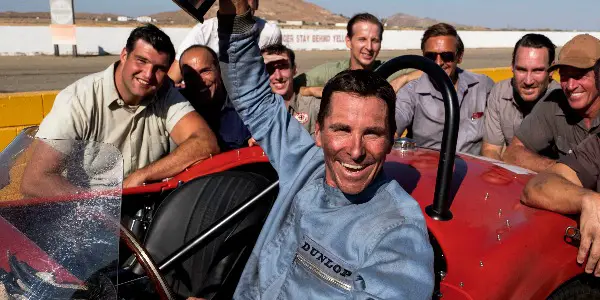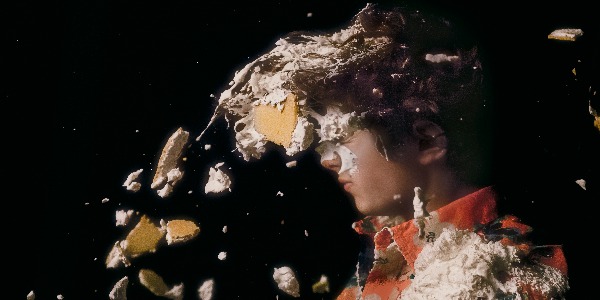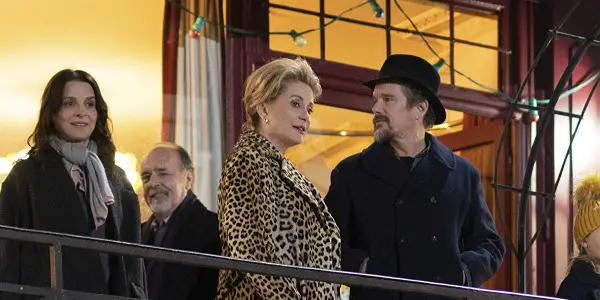2019 Film Fest 919 Report 2: FORD V FERRARI, HONEY BOY & THE TRUTH

I'm a student at the University of North Carolina at…
In my second report from 2019’s Film Fest 919, I tackle some of the biggest heavyweights of the festival: James Mangold‘s latest big-budget epic, Alma Har’el‘s Shia LaBeouf-penned autobiographical drama, and Hirokazu Kore-eda‘s first foray into French cinema. First, let’s start with the only true blockbuster of the festival: Ford v Ferrari.
Ford v Ferrari (James Mangold)

The first thing to know about Ford v Ferrari is that it’s too long. Many press members at Film Fest 919 liked this one to varying degrees, but everyone concluded that it could afford to lose a good amount of its current running time. James Mangold‘s racing epic runs 152 minutes, and it could easily cut 30 or even 45 minutes without losing much of its overall impact. To be blunt, it’s also something of a structural mess, a film that seems rather lost and unfocused before finally finding its footing.
Let’s be honest: at this point in the review, you’re probably thinking this all sounds pretty negative, right? Well, with those two massive, noteworthy caveats out of the way, it’s safe to say that I quite enjoyed Ford v Ferrari, both as a blockbuster respite from the emotional heavyweights at the festival and as an old-fashioned drama told on an event movie scale. Through sheer star power and spectacle, Mangold‘s latest overcomes problems that would easily debilitate any other movie. That’s no easy feat.
It’s the early 1960s in America — the height of the Mad Men era — and Henry Ford II (the ever-reliable Tracy Letts) wants to buy Ferrari. The iconic Italian car manufacturer is struggling, and Ford II (also known as “The Deuce”) sees this as an opportunity to build a racing partnership that will be mutually beneficial. The Deuce sends Lee Iacocca (Jon Bernthal) to Italy to broker a deal, but for simplicity’s sake, let’s just say Enzo Ferrari (Remo Girone) does not take kindly to this offer. Angry and humiliated, Ford decides on a second option: building a racing team from the ground up.
To build the next great American automobile and win the 24 hour race at Le Mans, Ford turns to Carroll Shelby (Matt Damon), a racing icon with the right skill set to beat Ferrari. But it can’t be Shelby behind the wheel — he has a heart condition that prevents him from racing at Le Mans again. For this task, Shelby knows there’s only one man for the job: Ken Miles (Christian Bale), a hot-headed British driver. Despite his prickly personality and disdain for collaboration, Ken is the only one who can build a car better than Ferrari. It’s not an easy road for Shelby and Miles — Ford’s top adviser, Leo Beebe (Josh Lucas), seems hellbent on making sure Miles doesn’t lead the company to the finish line. But even with some internal resistance, the racing world’s heavily accented odd couple —Damon and Bale are laying it on thick here — may just pull off an upset for the ages.
Though it isn’t quite as affectionately curated as the old-school relics of something like Quentin Tarantino‘s Once Upon a Time in Hollywood, Ford v Ferrari does share a certain kinship with recent nostalgia vehicles. It is steeped in the consumer hallmarks of mid-century Americana: Coke bottles, Ford cars, Coppertone ads, old-school outfits, playful architecture, the list goes on and on. Like Tarantino‘s mid-summer masterpiece, it’s a lament for a bygone era of American life, though in this case it longs for a lost moment of American brilliance: it fondly remembers a time when two men could be handed an impossible task and somehow figure out a way to beat the odds. Unlike Ron Howard‘s Rush — which remains undefeated as the great modern racing movie — Ford v Ferrari has no lingering interest in the psychology of racing. Instead, Mangold wisely reduces the sport to a quest for mechanical perfection, a strategic method of pushing the car to its absolute limits to achieve victory.
Coupled with its love of old-fashioned American style, Ford v Ferrari fully embraces its status as a throwback blockbuster. Though this may require a bit of an interpretive jump, the film as a whole seems to yearn for the pre-Disney days when big-budget films were still made by real craftsmen, telling star-driven stories on a gargantuan scale. Mangold may have made big bucks with two superhero epics, but he’s still one of Tinseltown’s lone gunslingers, pushing to keep an old, theoretically outdated mode of populist cinema alive.
Even with some pretty glaring flaws, it’s hard not to admire Ford v Ferrari for this reason alone.
Honey Boy (Alma Har’el)

The tumultuous life of controversial actor Shia LaBeouf gets the cinematic treatment in Honey Boy, which jumps between the star’s abuse-riddled childhood and his reflective stint in rehab. Like many of this year’s festival selections, it’s a tough, sometimes painful film to endure, serving as another family drama rooted in the destructive relationship between a father and a son. However, Honey Boy charts an opposite trajectory — where films like Waves and Sorry We Missed You track the downward spiral of familial relationships, director Alma Har’el‘s narrative debut focuses on reconciliation. Running just 93 minutes (mercifully, the shortest film I saw at 919) and unsuccessfully juggling a catharsis across two time periods, this is indeed a somewhat modest work. Yet slight as it may be, Honey Boy is honest and emotionally potent — and that’s an asset that should never be undervalued.
Rising star Noah Jupe (best known for A Quiet Place and Wonder) plays Otis, a pre-teen stand-in for LaBeouf. Otis is a child actor, performing in silly projects in order to provide for his broken family. His home life is anything but pleasant — his father, a former rodeo clown named James Lort (LaBeouf, playing his own dad), is emotionally and physically abusive, struggling so intensely with his own problems that he doesn’t know how to be a good father. Otis and James live in a downtrodden apartment, where verbal abuse and sudden arguments are a daily occurrence.
Young Otis’ life in the late 1990s is framed as a memory from the perspective of an older Otis (played by Lucas Hedges); now in his 20s and on a path to complete self-destruction, Otis is facing a choice between rehab and jail. When his therapist tells him that he has numerous signs of post-traumatic stress disorder, Otis is in denial. But as he digs back into his past, recovering memories that he tried hard to forget, Otis slowly finds a way to move on from the pain and the rocky relationships that have haunted him since childhood.
Honey Boy tells an incredibly personal story in great detail, and its specificity is both liberating and myopic. By limiting its scope in such a disciplined way—with the exception of the scenes of adult Otis in rehab, the film almost plays as a two-hander between Jupe and LaBeouf — Har’el‘s film depicts the full scope of this minefield of a father-son bond. Like many of this year’s brutally emotional family dramas, Honey Boy is in-your-face and frequently showy, with a number of moments designed to elicit a physical reaction.
But while LaBeouf, through Otis, starkly revisits the trauma and cruelty inflicted by his father and the irresponsible parenting that may have led him down dark roads, the film impressively captures the full scope of the relationship: the bright spots amid the horror. While LaBeouf‘s performance as James Lort is often deliberately grating and unlikable, the film smartly develops his own traumatic past, tracking the pain that travels from generation to generation. It’s no excuse for belittling and abusing his only son, but it makes Lort’s actions all the more heartbreaking.
Though Honey Boy‘s ultimate destination is a touch less overwhelming than one would expect (perhaps I was on emotional overload at this point in the festival), Har’el‘s expressive, gorgeous filmmaking frequently elevates the experience. So many quiet moments in Otis’ life are depicted with such tenderness—a loving embrace with a neighbor (FKA Twigs), an emotional, dreamlike reunion — that it’s difficult not to be moved Buried underneath the violence and the anger, Honey Boy‘s affection and warmth make it a worthy journey.
The Truth (Hirokazu Kore-eda)

After winning the Palme d’Or in 2018 with Shoplifters, a quiet family saga that earned plaudits from critics and awards voters, beloved Japanese filmmaker Hirokazu Kore-eda is back with The Truth, his first cinematic foray outside of Japan. On paper, it sounds like a home run: the legendary Catherine Deneuve, starring alongside the equally iconic Juliette Binoche and American star Ethan Hawke. Considering Kore-eda‘s last film and the unofficial theme of this year’s Film Fest 919, it’s unsurprising that this is another family drama, a film fascinated by the dynamics of these relationships and the long-standing grudges that simmer over decades. It’s rich material for a trio of great performers, which makes it all the more unfortunate that Kore-eda‘s latest never fully comes alive.
Deneuve stars as Fabienne, a world-famous, César award-winning actress who has just published her first tell-all memoir. It’s difficult to know what’s real and what’s fiction in Fabienne’s candid account of her life — especially when her own family members are contradicting her memories. The publication of the much-anticipated memoir coincides with the return of Lumir (Binoche) to her mother’s gorgeous French abode; she’s visiting with her TV actor husband Hank (Hawke) and young daughter Charlotte (Clémentine Grenier).
What should be a happy reunion ultimately reveals a number of deep-seated conflicts between the mother-daughter duo, conflicts that stretch all the way back to Lumir’s childhood and her mother’s early ascent to the upper echelon of international stardom. With Fabienne’s latest science-fiction movie also exploring the nature of mother-daughter relationships—and grappling with the arrival of a new star (Manon Clavel) who could be Fabi’s successor — Kore-eda‘s basic narrative framework becomes (in theory) the starting point for an exploration of a path toward mutual truth, reunion, and the acceptance of fading glory.
For a film that, on paper, deals with a number of worthy ideas, The Truth is almost aggressively pleasant at every turn. The stars are charismatic and the photography is appropriately lush; one particular image of the foliage around Fabi’s house is practically ingrained in my mind. However, it’s often so pleasant that its occasional moments of unpleasantness feel like a respite — a refreshing reminder that, yes, we’re still dealing with themes and relationships worth considering here. I’m certainly not opposed to something light and fluffy, especially with this group of actors involved. Yet The Truth insists on teasing something more substantial and theoretically “important,” which is something it can’t quite deliver on.
This, precisely, is what makes Kore-eda‘s latest so frustrating: it promises the emotionally rigorous breakdown of a relationship, only to shy away from that material when push comes to shove. At times, the director seems to suggest an interest in an Autumn Sonata-style clash between Fabienne and Lumir, but the ultimate resolution is too simple and too easy for that kind of story; The Truth never wants to dig deep enough for that. Tensions appear with a bang and dissipate without a trace, leading to a sentimental conclusion that never earns its sappiness. Despite working with a handful of potentially fascinating strands, Kore-eda‘s latest never follows through on its plethora of potential in any meaningful way.
That’s it for this report from Film Fest 919. Come back soon for report #3!
Which of these films are you most excited to see? What’s your favorite autobiographical movie? Let us know in the comments below!
Ford v Ferrari will be released on November 15, 2019 in the US and the UK. For all international release dates, click here.
Honey Boy will be released on November 8, 2019 in the US and on December 6, 2019 in the UK. For all international release dates, click here.
The Truth will be released in the US and UK in 2020. For all international release dates, click here.
Does content like this matter to you?
Become a Member and support film journalism. Unlock access to all of Film Inquiry`s great articles. Join a community of like-minded readers who are passionate about cinema - get access to our private members Network, give back to independent filmmakers, and more.
I'm a student at the University of North Carolina at Chapel Hill. For 8 years, I've edited the blog Martin on Movies. This is where I review new releases, cover new trailers, and discuss important news in the entertainment industry. Some of my favorite movies- Casablanca, Inception, Singin' in the Rain, 2001: A Space Odyssey, The Wolf of Wall Street, The Nice Guys, La La Land, Airplane!, Skyfall, Raiders of the Lost Ark. You can find my other reviews and articles at Martin on Movies (http://martinonmovies.blogspot.com/).













